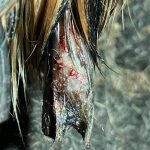hello,
I’m sorry to hear about your cat. But I cannot provide much assistance based on what you’ve provided here. Certainly things like infection , trauma and other diseases might cause this. I think the vet needs to be consulted again.
If needed go ask for a second opinion from another vet,, maybe even a cat specialist
sincerely
dr magnifico













Hello,
What advice has your veterinarian given you. ? It seems like there are lots of options for you they should be offering.
I think it’s a good idea to start with them. If you are worried about a budget be honest with them. They should be able to offer lots of things to try after they confirm it is allergies. These cases always start with a thorough discussion of history and a list of things to try. Some are over the counter and others are more expensive like apoquel or cytopoint.
I hope this helps.
Thanks Dr Magnifico. My dog is actually a current patient at Jarrettsville Vet and I plan on calling tomorrow to make an appointment. I called today but with the holiday they are closed. Totally understandable.
We have some medicine from her bad reaction last summer, but I was worried to try those because I am not 100% sure what the cause of her symptoms are this time around.
Only one of her ears is swollen this time, so I am curious if it’s an infection- but no foul smell or odd colors. Definitely red & swollen though.
I was mostly concerned about her not eating. Thank you for the advice, again I plan on calling the office tomorrow to hopefully get an appointment if there’s been no improvement.